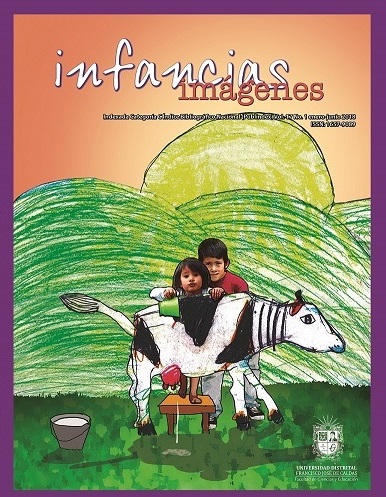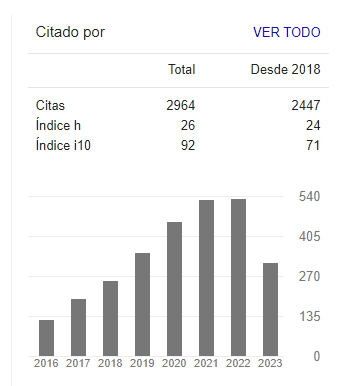DOI:
https://doi.org/10.14483/16579089.11250Published:
2018-04-02Issue:
Vol. 17 No. 1 (2018): enero-junioSection:
Textos y contextosHabilidades pragmáticas, imaginación y comprensión de los estados mentales en los niños
Keywords:
teoría de la mente, imaginación, amigos imaginarios, lenguaje pragmático, conversaciones familiares (es).Downloads
Abstract (es)
El objetivo de este artículo es analizar la influencia del lenguaje y la imaginación en el desarrollo de la teoría de la mente (Theory of Mind o ToM) en los niños. Inicia con la definición del concepto de ToM y la exposición de las diferentes teorías que han intentado explicar dicho desarrollo en los niños. De igual forma, el artículo aborda estudios que relacionan la ToM con la imaginación y con el lenguaje pragmático. Con respecto a la imaginación, se hace un recorrido especial por los estudios que involucran a los niños con amigos imaginarios y su relación con el mundo social. En relación con el lenguaje pragmático se destaca la influencia de las conversaciones familiares con contenido mental para el desarrollo de la ToM. Por último, el artículo muestra la importancia de los procesos simbólicos en el desarrollo de la ToM en los niños y aporta desde su conclusión elementos para fomentar su desarrollo.
References
Ames, L. B. y Learned, J. (1946). Imaginary companions and related phenomena. Journal of Genetic Psychology, 69, 147-167.
https://doi.org/10.1080/08856559.1946.10533385
Astington, A. (1998). El descubrimiento infantil de la mente. Madrid: Morata.
Astington, A. y Jenkins, J. (1999). A longitudinal study of the relation between language and theory of mind development. Developmental Psychology, 35(5), 1311-1320.
https://doi.org/10.1037/0012-1649.35.5.1311
Astington, A. y Baird, J. (2005). Why Language Matters for Theory of Mind. Oxford: Oxford Scholar.
https://doi.org/10.1093/acprof:oso/9780195159912.001.0001
Brinthaupt, T. M. y Dove, C. T. (2012). Differences in self-talk frequency as a function of age, only-child, and imaginary childhood companion status. Journal of Research in Personality, 46(3), 326-333. DOI:10.1016/j.jrp.2012.03.003
https://doi.org/10.1016/j.jrp.2012.03.003
Carpendale, J. y Lewis, C. (2006). How Children Develop Social Understanding. Malden (Massachusetts): Blackwell Publishing.
Cicchetti, D., Rogosch, F. A., Maughan, A., Toth, S. L. y Bruce, J. (2003). False belief understanding in maltreated children. Development Psychopathology, 15(4), 1067-91.
https://doi.org/10.1017/S0954579403000440
Davis, P., Meins, E. y Fernythough, C. (2011). Selfknowledge in childhood: Relations with children's imaginary companions and understanding of mind. British Journal of Development Psychology, 29(3), 680-686.
https://doi.org/10.1111/j.2044-835X.2011.02038.x
De Villiers, P. (2005). The role of language in theory of mind development: What deaf children tell us. En J. W. Astington y J. A. Baird, Why Language Matters for Theory of Mind (pp. 266-297). Oxford: Oxford University Press.
https://doi.org/10.1093/acprof:oso/9780195159912.003.0013
Dunn, J., Bretherton, I. y Munn, P. (1987). Conversations about feeling states between mothers and their young children. Developmental Psychology, 23(1), 132-139.
https://doi.org/10.1037/0012-1649.23.1.132
Dunn, J., Brown, J., Slomkowski, C., Tesla, C. y Youngblade, L. (1991). Young children's understanding of other people's feelings and belief: Individual difference and their antecedents. Child Development, 62, 1352-1366.
https://doi.org/10.2307/1130811
Gleason, T. R. (2004), Imaginary companions: An evaluation of parents as reporters. Infant and Child Develop, 13(3), 199-215. DOI:10.1002/icd.349
https://doi.org/10.1002/icd.349
Gleason, T. (2002). Social provisions of real and imaginary relationships in early childhood. Developmental Psychology, 38(6), 979-992.
https://doi.org/10.1037/0012-1649.38.6.979
Gleason, T., Sebanc, A. y Hartup, W. (2000). Imaginary companions of preschool children. Developmental Psychology, 36(4), 419-428.
https://doi.org/10.1037/0012-1649.36.4.419
Harris, P. (1992). From simulation to folk psychology: The case for development. Mind and Language, 7(1), 120-144.
https://doi.org/10.1111/j.1468-0017.1992.tb00201.x
_____. (2000). The Work of Imagination. Oxford: Blackwell Publishers.
Harter, S. y Chao, C. (1992). The role of competence in children's creation of imaginary friends. Merill-Palmer Quartely, 38(3), 350-363.
Hoff, E. (2005). Language Development. Nueva York: Cenage Learning.
Honeycutt, J., Pecchioni, L., Keaton, A.S y Pence, M. (2011). Developmental implications of mental imagery in children. Journal Imagination, Cognition and Personality, 31(1), 79-98. https://doi.org/10.2190%2FIC.31.1-2.h
https://doi.org/10.2190/IC.31.1-2.h
Hurlock, E. y Burstein, W. (1932). The imaginary playmate. Journal of Genetic Psychology, 41, 380-392.
Johnson, C. (1988). Theory of mind and the structure of conscious experience. En J. Astington, P. Harris y D. Olson (Eds.), Developing Theories of Mind (pp. 47-63). Oxford: Cambridge University Press.
LeBar, M. (2001). Simulation, theory, and emotion. Philosophical Psychology, 14(4), 424-432.
https://doi.org/10.1080/09515080120088094
Leslei, A. (1987). Pretense and representation: The origins of Theory of Mind. Psychological Review, 94(4), 412-426.
https://doi.org/10.1037/0033-295X.94.4.412
Manosevitz, M., Fling, S. y Prentice, N. (1977). Imaginary companions in young children: Relationships with intelligence, creativity and waiting ability. Journal of Child Psychology and Psychiatry, 18, 73-78.
https://doi.org/10.1111/j.1469-7610.1977.tb00418.x
Manosevitz, M., Prentice, N. y Wilson, F. (1973). Individual and family correlates of imaginary companions in preschool children. Developmental Psychology, 8, 72-79.
https://doi.org/10.1037/h0033834
Mendoza, E. y López, P. (2004). Consideraciones sobre el desarrollo de la teoría de la mente (TdM) y del lenguaje. Revista de Psicología General y Aplicada, 57(1), 49-67.
Miller, C. (2006). Developmental relationships between language and the theory of mind. American Journal of Speech-Language Pathology, 15(2), 142-153.
https://doi.org/10.1044/1058-0360(2006/014)
Premack, D. y Woodruff, G. (1978) Does the chimpanzee have a theory of mind? Behavioral. Brain Sci, 1, 515-526.
https://doi.org/10.1017/S0140525X00076512
Ruffman, T., Perner, J. y Parkin, L. (1999). How parenting style affects false belief. Social Development, 8(3), 395-411. DOI: 10.1111/1467-9507.00103
https://doi.org/10.1111/1467-9507.00103
Ruffman, T., Slade, L. y Crowe, E. (2002). The relation between children's and mothers' mental state language and theory-of-mind understanding. Child Development, 73(3), 734-751.
https://doi.org/10.1111/1467-8624.00435
Singer, D. G. y Singer, J. L. (1992). The house of makebelieve. Cambridge: Harvard University Press.
Somers, J. U. y Yawkey, T. D. (1984). Imaginary play companions: Contributions of creative and intellectual abilities of young children. The Journal of Creative Behavior, 18(2), 77-89. http://dx.doi.org/10.1002/j.2162-6057.1984.tb00370.x
https://doi.org/10.1002/j.2162-6057.1984.tb00370.x
Svendsen, M. (1934). Children's Imaginary Companions. Archives of Neurology and Psychiatry, 32, 985-999.
https://doi.org/10.1001/archneurpsyc.1934.02250110073006
Taylor, M. (1999). Imaginary Companions and the Children Who Create Them. Oxford: Oxford University Press.
Taylor, M. y Carlson, S. (1997). The relation between individual difference in fantasy and the Theory of Mind. Child Development, 68, 436-455.
https://doi.org/10.2307/1131670
Taylor, M., Cartwright, B. y Carlson, S. (1993). A developmental investigation of children's imaginary companions. Developmental Psychology, 29(2), 276-285.
https://doi.org/10.1037/0012-1649.29.2.276
Taylor, M., Hodges, S. D. y Kohanyi, A. (2003). The illusion of independent agency: Do adult fiction writers experience their characters as having minds of their own? Imagination, Cognition and Personality, 22, 361-380.
https://doi.org/10.2190/FTG3-Q9T0-7U26-5Q5X
Taylor, M., Hullette, A. y Dishion, T. (2010). Longitudinal outcome of young high risk adolescent with imaginary companions. Developmental Psychology, 46(6), 1632-1636. DOI: 10.1037/a0019815.
https://doi.org/10.1037/a0019815
Wimmer, H., y Perner, J. (1983). Beliefs about beliefs: representation and constraining function of wrong beliefs in young children's understanding of deception. Cognition, 13(1), 103-128.
How to Cite
APA
ACM
ACS
ABNT
Chicago
Harvard
IEEE
MLA
Turabian
Vancouver
Download Citation
License
Copyright (c) 2018 Jacqueline Benavides Delgado

This work is licensed under a Creative Commons Attribution-NonCommercial-ShareAlike 4.0 International License.
Reconocimiento – NoComercial – CompartirIgual (by-nc-sa): No se permite el uso comercial de la obra original, las obras derivadas deben circular con las mismas condiciones de esta licencia realizando la correcta atribución al autor.
Esta obra está bajo una licencia de Creative Commons Reconocimiento-NoComercial-CompartirIgual 4.0 Internacional






1.png)

